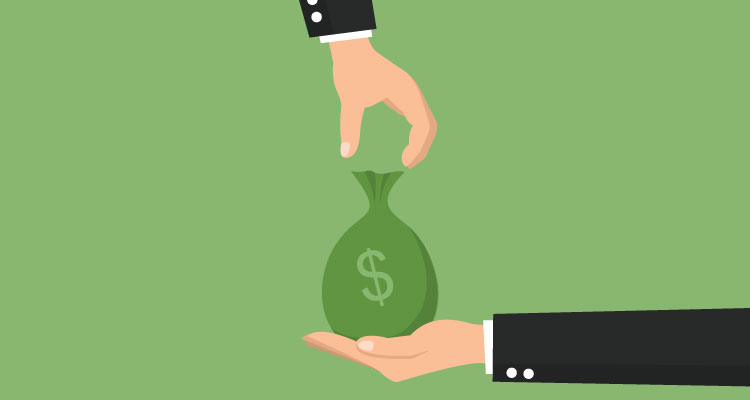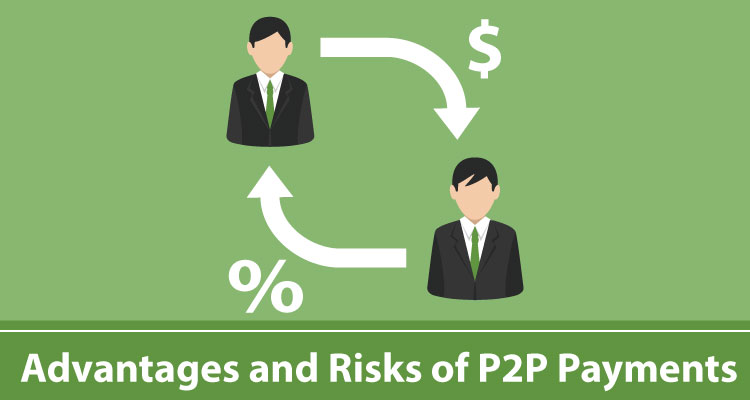There’s no shortage of exciting and convenient payments technologies these days, but none are as buzzworthy as P2P payments. In fact, it has been estimated that mobile P2P transactions volume could reach $86 billion in the U.S. by 2018. So what are the Advantages and Risks of P2P Payments?

Table of Contents
ToggleAn Overview of P2P Payments
I know this is splitting hairs here, but technically every type of payment is a P2P payment. After all, every party involves two parties where one person pays another — regardless if it’s cash, credit, or ACH. However, we’re talking about solutions that have been popularized by Due, PayPal, Venmo, and Square Cash.
Even social channels like Facebook and Snappish have decided to get in on the fun, as are traditional financial players like Visa and MasterCard.
In a nutshell, P2P payments work as follows; you create an account with a P2P solution lke Due or Venmo, link your credit or debit card or bank account, and you’re all set to go. The next time you borrow $20 from your best friend or want to split your family’s dinner tab, you can do so just by transferring funds from your account to theirs in just a click or two.
There’s a lot to like about P2P payments, but there’s also some valid concerns. So, before you start transferring money to your friends and family, or accept them as a business owner, here are the advantages and risks of P2P payments.
The Advantages of P2P Payments
Hands down the main advantage with P2P payments is the convenience, speed, and ease-of-use. As mentioned earlier, transferring funds from one person to another can be accomplished through a click of a button.
Another perk is the costs involved. Unlike many other payment solutions that involve several middlemen, P2P payments, especially cryptocurrencies like bitcoin, are between two parties. This means that you don’t have to pay for expensive transaction, processing, or service fees. In fact, most solutions don’t charge users when they receive money.
For the most part, P2P payments are also secure because they’re encrypted and have fraud monitoring capabilities. With payments like bitcoin, however, all transactions are tokenized and recorded in a real-time ledger so it’s much more challenging to commit any fraudulent activities. Also, since platforms like bitcoin emphasize anonymity, they don’t contain much personal information, so data breaches are usually not as detrimental.
However, many platforms are beginning to use additional security features like biometrics and most send automatic notifications for every transaction. For instance, I recently got an email from PayPal for a transaction that I didn’t authorize. I was able to act immediately and no damage was done.
The Risks of P2P Payments
Despite the awesome advantages that I just listed, there are some risks involved with P2P payments.
For starters, refunds are hard, and possibly nonexistent to initiate, since there isn’t a middleman involved, such as a credit card processor or regulatory body. This means if you paid a merchant via bitcoin and the product was defective, it’s up to the merchant to issue the refund.
Some other considerations are:
- Transactions may still take one to three business days.
- Transactions fees around 2 percent.
- Human error, like sending money to the wrong email address.
However, the biggest concerns involving P2P payments are fraud and security. While P2P payments are secure, they’re not infallible. In fact, several Venmo users have had their funds disappear without explanation.
Additionally, platforms like Dwolla have been hit with a $100,000 fine by the Consumer Financial Protection Bureau the service “did not adopt or implement reasonable and appropriate data-security policies and procedures governing the collection, maintenance, or storage of consumers’ personal information.”
Nowadays, if companies do not take proper precautions against fraud, they will be hit with fines. The hope is that this can close the gap better on loss from fraud. Companies will have to stay ahead of the fraudsters who will always be ever present — everywhere.
If you have your bank account connected to your account, you could be putting your personal data in danger and may want to consider unlinking these two accounts.
The Bottom Line on P2P Payments
Let’s be honest. There isn’t a payment platform that is 100 percent secure. However, when you do settle on a P2P platform, like for reputable companies that are PCI compliant and have good customer review regarding their security. So, you shouldn’t let that scare you away from P2P payments
The decision should come down to factors like the fees involved and how long it takes a transaction to clear. If you’re concerned about a refund, companies like Bitrated offers reputation and arbitration so you can conduct a chargeback if you’re not satisfied.
Ultimately, the convenience, speed, low costs, and security make P2P payments an appealing options. Both merchants and users just want to pay their friends back or split bills.













